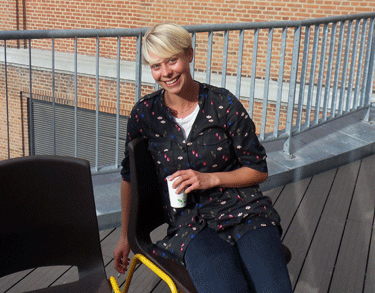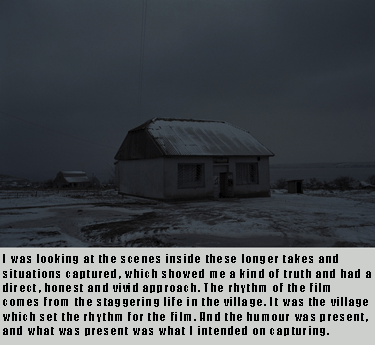Festivali NORDISK PANORAMA - 5 CITIES: AARHUS
Aarhus, Denmark 2011
| Recent years have witnessed an explosion of documentary films from the Nordic countries and Nordisk Panorama-five cities festival 2011, hosted in unusually sunlit Aarhus, could boast of yet another selection of high-quality Nordic shorts and docs.
This year's festival selection was highly varied, with vibrant and deeply resonating film works. Films exhibit a heightened awareness of the environmental changes, financial crisis affecting farms in Denmark (e.g. Pig Farm); explore the human curiosity and thirst for (scientific and metaphysical) knowledge when isolated and stranded at oceans' mysterious depths (e.g. Aranda); convey a personal drama in the midst of a historical turmoil of the Egyptian revolution (e.g. 1/2 Revolution); tackle the burning issues of immigration and identity confusion in a documentary genre hybrid (e.g. Imagining Emanuel), make the silenced voices heard after a traumatizing war experience through a perspective of revaluation and reconstruction (e.g. Solace); redefine the role of art that can change the lives of prisoners (e.g. At Night Fly); review a woman's search for freedom and a room of her own through the process of demystification of the famous men in her life (Love always, Carolyn, centred on USA literary cult figures of Carolyn's husband Neal Cassady and her lover Jack Kerouac). According to the words of the festival director, Karen Rais-Nordentoft, "there are good reasons to celebrate and be proud of such a strong presence, but the position needs to be maintained and supported by continuous and comprehensive promotional efforts". The festival selection committee, refreshingly, considers "gender issues" of the films presented, but acknowledges some difficulties when deciding upon the authorship status of collaborative film work made up of a gender-mix of producers, directors and on-screen protagonists. Although many films were centred around the female protagonist, most of the films selected were directed by men and "it seems to be a question of what films are produced, rather than who happens to be in the selections committee, as Karen Rais-Nordentoft claims. In the selection of New Nordic Voices, personal and autobiographical stories predominated, especially in Meeting My Father Kasper Hojhat and Inbetweener, which portray, in an exhibitionist but touching way, the search for the lost biological father or symbolic father figure and ensuing emotional vacuum and a renewed sense of self-identity through a kind of epiphany or a devotion to conceptual art. In an anthropological essayistic and visually experimental piece, Soul Catcher explores the belief system of some aboriginal tribes related to photography and the loss of their souls; the daring debut of Lina Mannheimer's The Contract paints a less ordinary love relationship; Baba, exquisitely directed by Anna Eborn, gives us a realistic glimpse of those less visible lives, concretely set in Ukraine, but resonating with universal dimensions. This year's FEDEORA prize was awarded to How to Pick Berries, directed by Elina Talvensaari, a superbly mastered visual poem, tackling the social issues of immigration and labour. Fedeora jury:
INTERVIEW: Anna Eborn, Baba Anna Eborn, born in 1983, is an artist and autodidactic filmmaker from Sweden, working and producing her films in Denmark. She studied Film and Photography in Malmö, Sweden and Human Geography at the University of Gothland, Sweden. She has worked as assistant director for Johan Melin's Profetia and Preludium, before starting to make hew own authorial film projects. Baba is her latest completed documentary film, screened at Gothenburg International Film Festival 2011 and Nordisk Panorama 2011 . Filmography: |
CL: When did you first hear of this community of Swedish women in Ukraine? Why did you want to make a film about them? CL: How long did it take to shoot the film? CL: How much material did you film? CL: How did you feel when you first came in touch with this secluded community? Do these women feel isolated, lonely, abandoned...? CL: You choose to convey to the audience a fragment of "ordinary" life of several elderly people, mostly women. An amazingly varied series of characters are (re)presented. The camera nuances them with sophistication: some seem to be resigned with their situation, some are nostalgic, some are playful and even display a great sense of humour (in spite of the mediocre conditions in which they live), others are bitter, angry, cynical... CL: The relationships in this small community are not always easy, sometimes there are sharp confrontations...
|



